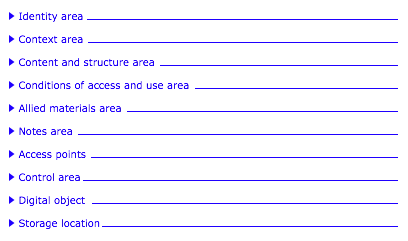Difference between revisions of "Template:RAD ISAD(G)ed"
| Line 48: | Line 48: | ||
The purpose of this template is to provide an interface for archival description that uses the elements and field labels of the Canadian ''Rules for Archival Description'' (RAD), but organizes them according to the areas of description in ISAD(G). | The purpose of this template is to provide an interface for archival description that uses the elements and field labels of the Canadian ''Rules for Archival Description'' (RAD), but organizes them according to the areas of description in ISAD(G). | ||
| − | RAD's descriptive areas are based on bibliographic standards. Three of its nine areas (1.2, 1.6, 1.9) are applicable only at the item level. Another area (1.3) applies only to specific media (cartographic records, architectural and technical drawings, philatelic records). A number of elements in the date (1.4 | + | RAD's descriptive areas are based on bibliographic standards. Three of its nine areas (1.2, 1.6, 1.9) are applicable only at the item level. Another area (1.3) applies only to specific media (cartographic records, architectural and technical drawings, philatelic records). A number of elements in the date and title areas (1.4 and 1.1) relate only to the description of published items. In terms of interface, this is a lot of real estate to give to elements that are not relevant to typical, aggregate level description. On the other hand, a large number of elements that are commonly used are clustered in the ''Notes area'' (1.8). |
| − | The result is that a template following RAD closely devotes a large number of areas and elements to fields not | + | The result is that a template following RAD closely devotes a large number of areas and elements to fields not frequently used; while many fields that are heavily used are buried in the ''Notes area''. The ''RAD ISAD(G)ed'' template resolves this problem by retaining the RAD elements and field labels, but organizing them according to the areas laid out in ISAD(G). |
| − | + | <br clear="right"> | |
| − | + | == Identity area == | |
Revision as of 14:57, 3 September 2008
Please note that ICA-AtoM is no longer actively supported by Artefactual Systems.
Visit https://www.accesstomemory.org for information about AtoM, the currently supported version.
Main Page > BCAUL pilot project > Templates
RAD template: ISAD(G)edDocument status: in progress
|
Contents |
Overview
The purpose of this template is to provide an interface for archival description that uses the elements and field labels of the Canadian Rules for Archival Description (RAD), but organizes them according to the areas of description in ISAD(G).
RAD's descriptive areas are based on bibliographic standards. Three of its nine areas (1.2, 1.6, 1.9) are applicable only at the item level. Another area (1.3) applies only to specific media (cartographic records, architectural and technical drawings, philatelic records). A number of elements in the date and title areas (1.4 and 1.1) relate only to the description of published items. In terms of interface, this is a lot of real estate to give to elements that are not relevant to typical, aggregate level description. On the other hand, a large number of elements that are commonly used are clustered in the Notes area (1.8).
The result is that a template following RAD closely devotes a large number of areas and elements to fields not frequently used; while many fields that are heavily used are buried in the Notes area. The RAD ISAD(G)ed template resolves this problem by retaining the RAD elements and field labels, but organizing them according to the areas laid out in ISAD(G).
